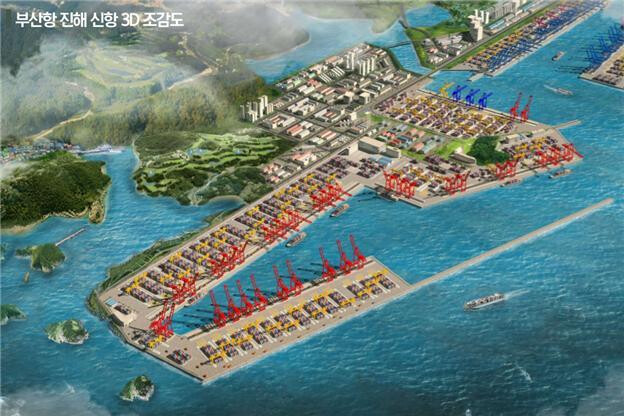
Busan, South Korea – The South Korean government has unveiled a comprehensive plan to transform Busan Port into one of the world's largest and most efficient shipping hubs. The ambitious project, backed by a 14 trillion won ($10.5 billion) investment, aims to enhance the port's global competitiveness and solidify its position as a key node in the global supply chain.
As outlined in the "Global Hub Port Development Strategy" announced by the Ministry of Oceans and Fisheries, the government will focus on expanding the Jinhae New Port, constructing new berths, and developing a vast logistics complex. By 2045, Busan Port is expected to boast a capacity that rivals the world's largest ports, such as Singapore's Tuas Port.
Key elements of the strategy include:
Expansion of Jinhae New Port: The government will invest heavily in expanding the Jinhae New Port, creating a total of 66 berths capable of accommodating ultra-large container vessels of up to 30,000 TEU. This will enable Busan Port to handle the increasing demand for larger ships and enhance its efficiency.
Consolidation of Terminal Operations: To improve operational efficiency and reduce costs, the government will consolidate terminal operations at Jinhae New Port under a single operator. This will enable the port to handle larger volumes of cargo more efficiently and attract more shipping alliances.
Development of Logistics Complex: A massive 3.62 million square meter logistics complex will be built near the port to attract global logistics companies. This will create more jobs, stimulate regional economic growth, and strengthen Busan Port's position as a global logistics hub.
Green Energy Transition: The port will undergo a significant green energy transition, with the goal of achieving 100% renewable energy generation by 2050. This will involve the installation of solar panels, fuel cells, and offshore wind farms, as well as the development of infrastructure for supplying eco-friendly ship fuels like methanol and ammonia.
Global Logistics Network Expansion: To enhance connectivity with global supply chains, the government will expand its network of overseas logistics centers in strategic locations such as the United States, Southeast Asia, and Europe. These centers will provide support services to Korean small and medium-sized enterprises.
"With increasing uncertainties in the global supply chain due to protectionism, regional conflicts, and changes in shipping alliances, this strategy is designed to position Busan Port as a top-three global port," said a spokesperson for the Ministry of Oceans and Fisheries.
By implementing these ambitious plans, the South Korean government aims to transform Busan Port into a world-class shipping hub, capable of handling the increasing volume of global trade and contributing to the country's economic growth.
[Copyright (c) Global Economic Times. All Rights Reserved.]






























